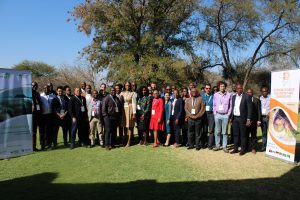
In picture, SASSCAL Executive Director, Dr Jane Olwoch, flanked by Hydrogen Atlas Africa project coordinator, Dr Solomon Agbo, SASSCAL Director of Science, Technology and Capacity Development, Dr Budzanani Tacheba, H2Atlas regional technical committee members and National team leaders.
SASSCAL successfully hosted a three-day technical review workshop on the progress of the completion of the Green Hydrogen Atlas, Southern Africa. This workshop took place from the 23rd to the 25th August 2022, under the theme “Go green Go Africa: Germany-Africa partnership for sustainable energy solution through green hydrogen”.
The workshop aimed to showcase the progress made in the production of the Southern Africa Green Hydrogen Atlas, to review the data submitted and identified gaps that have to be filled before the final product is released. This process also ensured ownership of the finished product by key stakeholders in the region.
The H2Atlas Southern Africa workshop was attended by various relevant stakeholders including Forschungszentrum Jülich team, regional technical committee, national team leaders and SASSCAL H2Atlas team members.
The H2Atlas – Africa project is an initiative of the German Federal Ministry of Education and Research (BMBF). In this project, the German research centre Forschungszentrum Jülich partners with a consortium of African relevant research institutions/organizations to explore the potentials of green hydrogen production from the enormous renewable energy sources within the African continent.
The Southern African Science Service Centre for Climate Change and Adaptive Land Management (SASSCAL) is the coordinating partner in Southern Africa and has collaborated with the SADC Centre for Renewable Energy and Energy Efficiency (SACREEE) as a technical implementing partner.
The aim of the H2Atlas-Africa project is to strengthen and support sustainable and economic development through a viable hydrogen economy. It will also enable the region to participate in the international energy markets allowing it to diversify its economies. The immediate outcome of the project will be an interactive Atlas, showing identified Green Hydrogen hotspots. It is envisaged that such a map will provide evidence-based information for policy-makers, researchers, and potential funders about the potential of a Green Hydrogen economy in the region.
The 1st phase commenced in August 2020 and twelve (12) SADC countries (Angola, Botswana, Eswatini, Democratic Republic of Congo, Malawi, Mauritius, Mozambique, Namibia, South Africa, Tanzania, Zambia and Zimbabwe) participated through representation by National teams which constituted of 5 team members.
The project implementation workplan required the national teams to collect and validate the data collected at National level together with the Regional Technical Committee as it is a crucial input in the development of the Southern Africa Green Hydrogen Atlas. At this stage, the first version of the Atlas has been developed and reviewed by the Regional Technical Committee and National Teams. The workshop went a step further to identify any data gaps and made a road map on how to fill those gaps.
The workshop consisted of a series of presentations followed by interactive sessions on:
- Ground water availability assessment
- Climate change impact: modelling and scenario
- Socioeconomics and local scenario indicators
- Eligible lands and renewable energy potentials
- Green Hydrogen potential: quantity and cost
The workshop outcomes were an important step towards the completion and future launch and publication of the final version of the Southern Africa Green Hydrogen Atlas.
It is clear that the date of the launch will be determined by the speed of the updates after the submission of the outstanding datasets from all member countries.
When fully completed and formally released to the public by the German Federal Ministry of Education and Research (BMBF), the H2 Atlas Southern Africa will be launched in SADC Member States.
Watch this Space!!!
Highlights of the Southern Africa Technical Review Workshop





